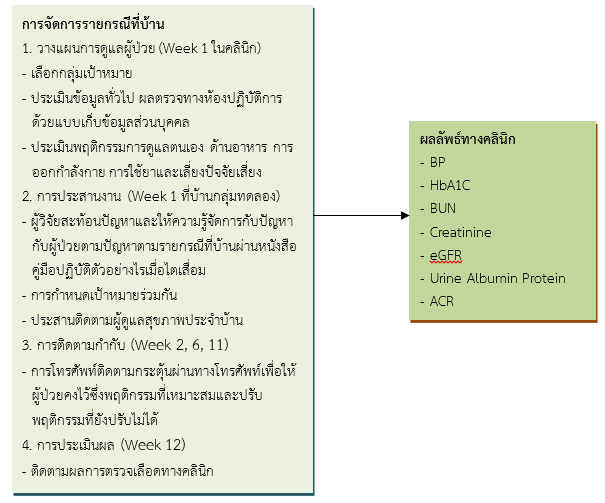ผลลัพธ์ทางคลินิกในการจัดการรายกรณีที่บ้านในผู้ป่วยโรคไตเรื้อรังระดับ 3
คำสำคัญ:
การจัดการรายกรณี, โรคไตเรื้อรังระดับ 3บทคัดย่อ
การวิจัยกึ่งทดลองแบบสองกลุ่มวัดผลก่อนและหลังมีวัตถุประสงค์เพื่อเปรียบเทียบผลลัพธ์ทางคลินิกประกอบด้วยค่าเฉลี่ยระดับความดันโลหิต Creatinine, Urine Protien Albumin (UPA), Albumin-to-Creatinine Ratio (ACR), Estimated Glomerular Filtration Rate (eGFR), Blood Urea Nitrogen (BUN), Hemoglobin A1c (HbA1C) ในการจัดการรายกรณีที่บ้านระหว่างกลุ่มควบคุมและกลุ่มทดลอง และเปรียบเทียบผลลัพธ์ทางคลินิกก่อนและหลัง ได้รับการจัดการรายกรณีที่บ้านในผู้ป่วยโรคไตเรื้อรังระดับ 3 จำนวน 40 คน กำหนดขนาดตัวอย่างใช้โปรแกรม N4studies ใช้สูตร Two Independent Means ได้กลุ่มตัวอย่างกลุ่มละ 20 คน เครื่องมือที่ใช้ในการทดลองได้แก่ กระบวนการจัดการรายกรณี 4 ขั้นตอน ประกอบด้วยวางแผนการดูแลผู้ป่วย การประสานงานการติดตามกำกับการประเมินผลและหนังสือคู่มือปฏิบัติตัวสำหรับผู้ป่วยโรคไตเรื้อรังตารางการติดตามโดยโทรศัพท์เครื่องมือที่ใช้ในการเก็บรวบรวมข้อมูลประกอบด้วยแบบสอบถามข้อมูลส่วนบุคคลแบบและเก็บข้อมูลผลลัพธ์ทางคลินิก การวิเคราะห์ข้อมูลใช้สถิติ จำนวน ร้อยละ สถิติ Independent t-test, Pair t-test, Mann Whitney U test และ Wilcoxon Signed-Rank test ผลการวิจัยพบว่า
1. หลังมีการจัดการรายกรณีที่บ้านค่าเฉลี่ยระดับความดันโลหิต Creatinine, UPA, ACR ระหว่างกลุ่มควบคุมและกลุ่มทดลองไม่มีความแตกต่างกันทางสถิติ แต่ค่าเฉลี่ย eGFR เพิ่มขึ้นค่า ค่าเฉลี่ย BUN ลดลงมีความแตกต่างอย่างมีนัยสำคัญทางสถิติที่ระดับ .05 ค่าเฉลี่ย HbA1C เพิ่มขึ้นมีความแตกต่างอย่างมีนัยสำคัญทางสถิติที่ระดับ .01
2. ผลลัพธ์ทางคลินิกก่อนและหลังในกลุ่มที่ได้รับการจัดการรายกรณีที่บ้านในผู้ป่วยโรคไตเรื้อรังพบว่าDiastolic blood pressure (DBP), BUN, UPA, ACR, HbA1C พบว่าค่าเฉลี่ย ก่อนและหลังได้รับการจัดการรายกรณีที่บ้านไม่มีความแตกต่างกัน แต่ค่าเฉลี่ย Systolic Blood Pressure (SBP) ลดลง, Creatinine ลดลง, eGFRเพิ่มขึ้นมีความแตกต่างอย่างมีนัยสำคัญทางสถิติที่ระดับ .05
ควรมีการศึกษาออกแบบการวิจัยเกี่ยวกับการควบคุมระดับความดันและการควบคุมการรั่วของโปรตีนในปัสสาวะในผู้ป่วยโรคไตเรื้อรังในครั้งต่อไปพยาบาลควรทำงานร่วมกับสหวิชาชีพในการร่วมกันจัดการรายกรณีที่บ้านเพื่อให้มีผลลัพธ์ที่มีประสิทธิภาพมากยิ่งขึ้นควรมีการใช้รูปแบบจัดการรายกรณีที่บ้านเป็นหนึ่งในกระบวนการพัฒนาพฤติกรรมการดูแลตนเองในผู้ป่วยโรคไตเรื้อรังระดับ3
เอกสารอ้างอิง
Allen, D. (2020). Global Facts: About Kidney Disease. National Kidney Foundation Inc. Retrieved january 9, 2020, from https://www.kidney.org/kidneydisease/global-facts-about-kidney disease.
Anaman, P., & Promdee, A. (2019). Effectiveness of Case Management in Diabetes Patients, Family Doctor Clinic. Mukdahan Hospital. Journal of Health Sciences Boromarajonani Nurse Sanphasitthiprasong, 3(2), 37-55. (in Thai).
Bill, G., & Melinda, G., (2020). Global, Regional, and National Burden of Chronic Kidneydisease, 1990–2017: a Systematic Analysis for the GlobalBurden of Disease Study 2017. The Lancet, 395, 709-733.
Bloom, Benjamins. (1976). Human Characteristics and School Learning. New York: McGraw Hill Book Company.
Couser, W. G., Remuzzi, G., Mendis, S., & Tonelli, M. (2011). The Contribution of Chronic Kidney Disease to the Global Burden of Major Noncommunicable Diseases. Kidney International, 80(12), 1258–1270. https://doi.org/10.1038/ki.2011.368.
Haileamlak, A. (2018). Chronic Kidney Disease is on the Rise. Ethiopian Journal of Health Sciences, 28(6), 681–682. https://doi.org/10.4314/ejhs.v28i6.1
Ing Satit, A., Chayakun, C., Chaiprasert, A.,Tirakupt, P., Siriwong, T., SaengThawan, P., et al. (2017). Disease Progression and Clinical Outcome of Nephrotic Syndrome. Chronic in the Thai SEEK Progression and Outcomes of CKD in Thai SEEK Population. Institute of Public Health System Research (HSRI), 1-41. (in Thai).
Jaimai, A., & Phegphon, K. (2018). Nursing in a Case Management Model for Type 2 Diabetes in the Community. Journal of Nursing Public Health and Education, 2(13), 17-28. (in Thai).
Jha, V., Garcia-Garcia, G., Iseki, K., Li, Z., Naicker, S., Plattner, B., et al. (2013). Chronic Kidney Disease: Global Dimension and Perspectives. Lancet (London, England), 382(9888), 260–272. https://doi.org/10.1016/S0140-6736(13)60687-X.
Kaenkarn, W., Dumnok, K., & Anutrakulchai, S. (2019). Effectiveness of a Model of Care for Chronic Kidney Disease Using Integrated Disease Management and Case Management in Primary Care Units. Northeast Journal of Nursing and Health Care, 37(3), 173-182. (in Thai).
Kantchuetsiri, S., ChanCharoenThan, W., ChaiLimpamontree, W., Trakanwanich, T., Kochaseni, P., Yusby, A., et al. (2016). Chronic Kidney Disease Textbook (1st ed.). Bangkok: Text and Journal CompanyPublication Co., Ltd.
Kosonchit, R., & Noimuen Wai, P. (2017). Effectiveness of Case Management in Patients with Diabetes, Pak Phli Hospital. Nakhon Nayok Province. Nursing material, 44(2), 26-38. (in Thai).
Laatiman, S., Sompet, T., Muthumol, P., & Thumdee, D. (2019). Development of Diabetes Care System with a Case Management Model Saraphi Hospital, Saraphi District, Chiang Mai Province. Medical Journal of Udon Thani Hospital, 25(3), 283-293. (in Thai).
Paengkha, W. (2017). Effectiveness of Diabetes Care with Diabetic Nephrotic Stage 2-4 with Case Management, Nam Nao Hospital Network, Nam Nao District, Phetchabun Province. Journal of Medical Studies Region 11, 31(3), 405-414. (in Thai).
Pender, N. J., Murdaugh, C. L., & Parsons, M. A. (2002). Health Promotion in Nursing Practice. 4th (ed). New Jersey: Pearson Education, Inc.
Singsangwean, P., Tipwareerom, W., & Juntarawijit, Y. (2019). The Effectof Self-Management Program on Food Consumption Behavior and Exercise and Glomerular Filtration Rate among Chronic Kidney Disease Stage 3 Patients with Hypertension. Journal of Nursing and Health Sciences, 13(3), 50-64. (in Thai).
Supaphan, S. (2019). Development of a Slowing-Down Model in Diabetic and Hypertensive Patients with Case Management at Phu Sing Hospital, Sisaket Province. Journal of Public Health, 28(5), 857. (in Thai).
Rattanaurai., U, & Songbutr., P. (2019). Effects of a Case Management Program in Diabetes Patients with Uncontrolled Sugar Levels. Journal of Public Health, 28(Special), 146-151. (in Thai).
Thangkratok, P. (2017). Role of Professional Nurse in Chronic Disease Management. Journal of Songkhla Nakarin Nursing, 37(2), 154-159. (in Thai).
Surat Thani Provincial Public Health Office. (2019). Health Data Center. Retrieved January 12, 2019 from https://sni.hdc.moph.go.th/hdc/reports/report.php?source.
Sirirawong, S. (2019). World Kidney Day 2019 "Everyone in Thailand Has a Healthy Kidney" Kidney Health for Everyone Everywhere. reporter@hooninside.com. March 6, 2019 from https://www.hooninside.com/news-feed/94048/view/.
World Kidney Day. (2015). Chronic Kidney Disease. (2015). Retrieved January 18, 2019 from http://www.worldkidneyday.org/faqs/chronic-kidney-disease/.

ดาวน์โหลด
เผยแพร่แล้ว
ฉบับ
ประเภทบทความ
สัญญาอนุญาต
1. บทความหรือข้อคิดเห็นใด ๆ ที่ปรากฏในวารสารเครือข่าย วิทยาลัยพยาบาลและการสาธารณสุขภาคใต้ ที่เป็นวรรณกรรมของผู้เขียน บรรณาธิการหรือเครือข่ายวิทยาลัยพยาบาลและวิทยาลัยการสาธารณสุขภาคใต้ ไม่จำเป็นต้องเห็นด้วย
2. บทความที่ได้รับการตีพิมพ์ถือเป็นลิขสิทธิ์ของ วารสารเครือข่ายวิทยาลัยพยาบาลและการสาธารณสุขภาคใต้







